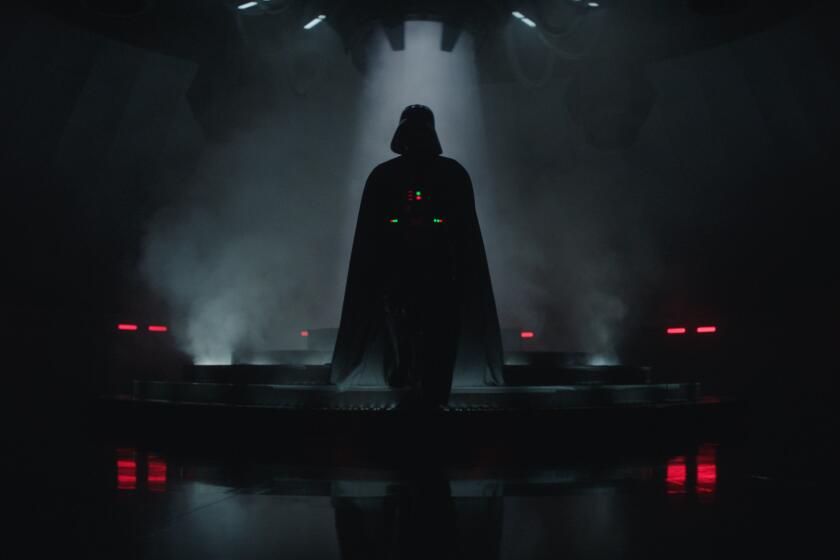News Analysis: What Jonathan Majors’ dramatic rise and fall says about race and justice in Hollywood
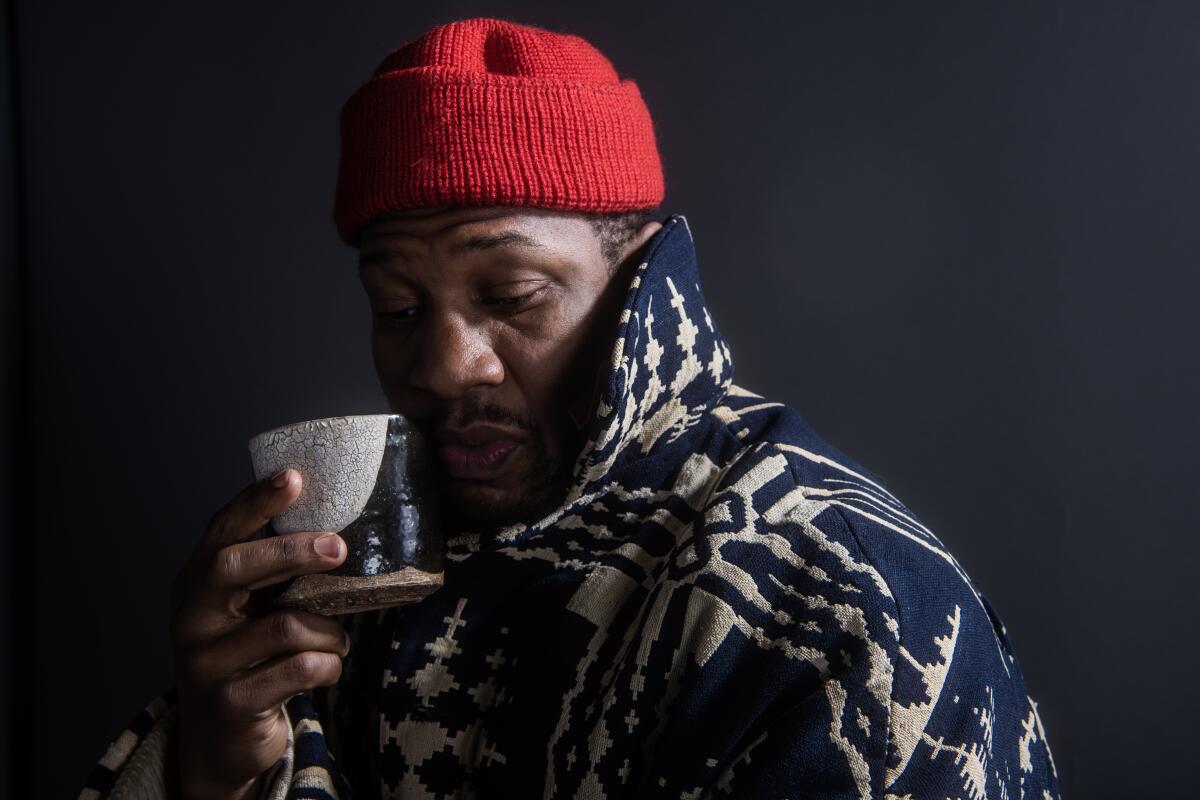
- Share via
Jonathan Majors was not afraid to admit it: He was terrified of the boogeyman.
Majors was thrilled to be swept up in a whirlwind that had anointed him the hottest, freshest face in Hollywood. But he was also aware that success of the magnitude he had achieved could come crashing down at any moment.
“Though I’ve not seen the boogeyman, I know it’s out there,” Majors told the Associated Press in an interview published in March. “And I’ve been around to know it’s comin’. I won’t go down my rabbit hole of death, but it’s comin’. But you outrun it. You just stay out of the frame. I’ll stay out of the frame, make my work.”
That work ignited awards buzz this year with the Sundance competition film “Magazine Dreams” just before his key turns in back-to-back No. 1 movies — as super-villain Kang the Conqueror in Marvel’s “Ant-Man and the Wasp: Quantumania” and as Michael B. Jordan’s vicious opponent Damian Anderson in “Creed III” — delighted audiences. And it brought the 33-year-old from breakout roles in the indie film “The Last Black Man in San Francisco” and HBO’s “Lovecraft Country” to the brink of superstardom, his ascension propelled by sexy magazine covers and consistently strong performances in projects such as “Loki,” “The Harder They Fall” and “Devotion.”
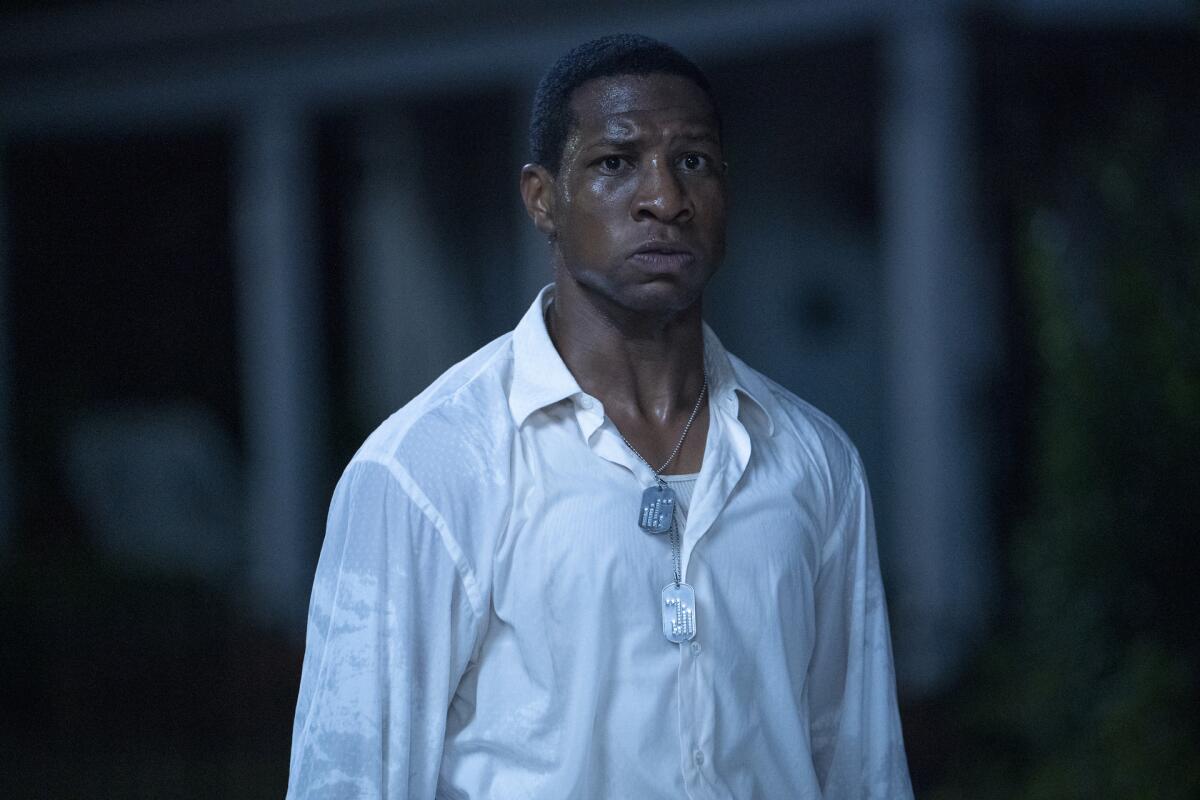
Few witnesses to this meteoric rise could have foreseen that the “boogeyman” he spoke of was so close around the corner, sending shock waves through the industry and potentially capsizing a promising career.
In one of the most dizzying rise-and-fall stories in recent Hollywood history, the muscular actor has retreated from public view, his reputation stained since he was arrested March 25 and charged with misdemeanor assault and harassment of a 30-year-old woman in New York. The U.S. Army has since scuttled ads featuring the former “Army brat,” and his management, Entertainment 360, and public relations firm, the Lede Co., dropped him. He has reportedly been booted from several future projects, including a film based on Walter Mosley’s novel “The Man in My Basement” and an ad campaign for the Texas Rangers baseball team.
A complaint filed by the Manhattan district attorney’s office details the unnamed woman accusing Majors of striking her “about the face with an open hand, causing substantial pain and a laceration behind her ear.” He also allegedly grabbed her hand, “causing swelling, bruising, and substantial pain to her finger” and “put his hand on her neck.”
A subsequent statement by the New York Police Department said the woman told officers she had been assaulted in a “domestic dispute” and was taken to a hospital with what they called minor injuries to the head and neck. The alleged victim has since been granted a full temporary restraining order. Variety reported in April that “multiple alleged abuse victims of Majors have come forward following his March arrest and are cooperating with the Manhattan district attorney’s office.”
Majors and his representatives have denied the allegations, insisting that he will be cleared of all charges. With specifics still to shake out, a number of the actor’s most important industry partners have stayed mum: Disney, which owns Marvel Studios, has not distanced itself from Majors, despite speculation that it could recast the Kang character in future projects, including a 2025 movie featuring the superhero group the Avengers. The date for the Season 2 premiere of “Loki,” which features Majors as Kang, remains in limbo.
Majors also remains attached to a Lionsgate film about eccentric basketball star Dennis Rodman; an Amazon Studios film, “Da Understudy,” to be directed by Spike Lee; and an untitled Amazon series about a rigorous ROTC military academy.
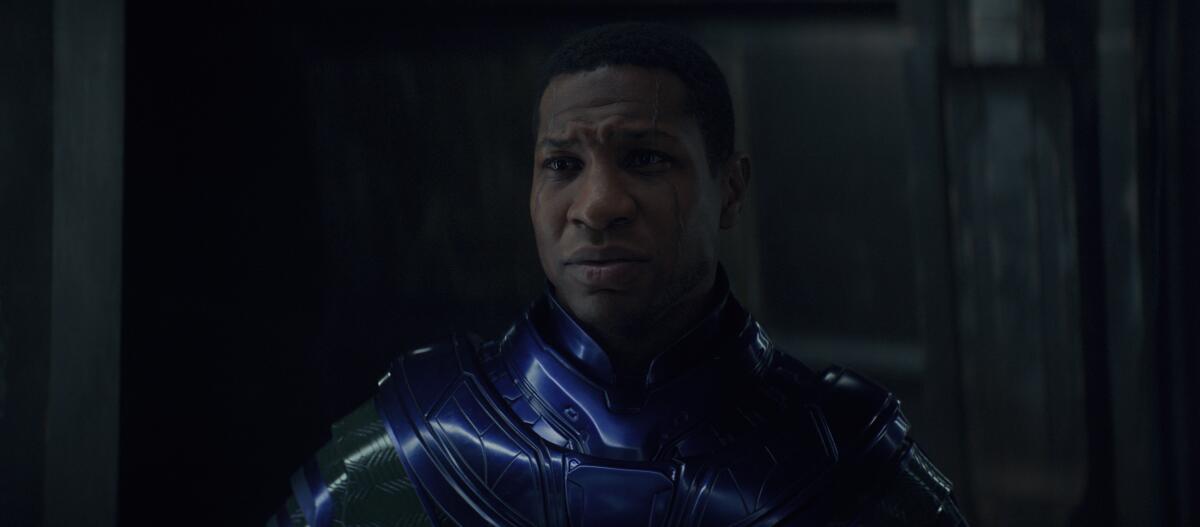
Since the arrest, Majors’ attorney has released what she claims are text messages from the alleged victim to the actor in the aftermath of the encounter. In the unverified messages, the woman says she told the police the incident was her “fault” for “trying to grab” Majors’ phone. In a follow-up text, she says she told authorities “this was not an attack and they do not have my blessing on any charges being placed.” In a letter to the court that was reviewed by The Times, Majors’ attorney also pointed to stills from security-camera footage that, she maintains, show Majors’ accuser uninjured at a nightclub after the alleged incident.
In advance of his first court date Tuesday, neither Majors’ attorney nor a spokesperson for the Manhattan district attorney’s office are detailing their legal strategies. But both emphasized that the proceeding is a routine step in the case, which remains in its early stages. Majors is scheduled to appear virtually.
Still, the swiftness and severity of the fallout from the arrest has been striking, even in an industry that has seen powerful figures toppled by misconduct allegations. Even if Majors is cleared of the charges, the damage to his career may be irreparable, experts say, in part because of his race.
“Throughout history, the narrative of the violent Black man has been built for a very long time,” said Todd Boyd, professor of arts and media studies at USC’s School of Cinematic Arts. “It has been used as justification to punish Black men. It’s hard to predict what impact this will have in this case, but it could become a real substantial issue, given the intensity surrounding race in this country.”
One executive — who has worked for major film and television studios and was granted anonymity in order to discuss Majors’ situation candidly — acknowledged that “there is not equity.”
Actor Josh Brolin in 2004 was arrested and charged with spousal battery following an argument with his then-wife, Diane Lane, at their West Hollywood home. Authorities said Lane called police during the dispute.
“There was a misunderstanding. ... Josh ended up being arrested for the lowest-end misdemeanor charge of domestic battery,” the couple’s spokesperson, Kelly Bush, said at the time. “Diane did not want to press charges and asked them not to arrest him, but in cases involving the possibility of any physical contact, the police have to arrest first, ask questions later. They are home together and are embarrassed the matter went this far.”
The case was subsequently dropped; the couple divorced in 2013.
Asked about the incident in a 2018 New York Times interview, Brolin said, “God, I’ve never been so careful with my words. Ever. Maybe in all 50 years. And there’s no reason for me to be other than there’s no explaining it. Do you know what I mean? The only person who can explain that would be Diane, and she’s chosen not to, so I’m OK with that.”
Brolin’s career continued to blossom despite the unsavory headlines. He scored a supporting actor Oscar nomination for his portrayal of tightly wound politician Dan White in the Harvey Milk biopic “Milk,” and his impressive resume includes “Dune,” “Sicario,” “No Country for Old Men” and Amazon Prime Video’s neo-western “Outer Range.” Like Majors, he has been a signature villain in the Marvel Cinematic Universe, playing the destroyer Thanos in several adventures, including “Avengers: Infinity War” and “Avengers: Endgame,” and another adversary, Cable, in “Deadpool 2.”
Then there’s Mel Gibson, who was recorded making antisemitic remarks during a 2006 arrest for driving under the influence in Malibu and pleaded no contest in March 2011 to charges of domestic abuse for hitting a former girlfriend.
Seven months later, Gibson presented Robert Downey Jr. with the American Cinematheque Award. In his acceptance speech, Downey, who credited Gibson with supporting him during his struggle with alcohol and drug addiction, asked the celebrity-packed crowd to forgive Gibson: “I would ask that you join me, unless you are completely without sin — in which case you picked the wrong f— industry — in forgiving my friend his trespasses and offering him the same clean slate you have me, allowing him to continue his great and ongoing contribution to our collective art without shame.”
Gibson, who took home an Oscar for best director in 1996 for “Braveheart,” was nominated in 2017 for directing the war epic “Hacksaw Ridge,” which scored several other nods, including best picture. He has continued to appear in films and is reportedly relaunching the “Lethal Weapon” franchise and making a sequel to “The Passion of the Christ.”
Said a prominent film and television publicist who requested anonymity in order to speak frankly about racism in Hollywood: “Yes, it’s true that you’re innocent until proven guilty. But it’s not an even playing field when you’re Black. No grace will be granted to [Majors]. It’s a whole different standard. There is grace for some but not for others.”
Sources pointed to the fate of Nate Parker, a Black actor and director whose career was derailed by scandal, as one potential outcome for Majors.
Parker’s “The Birth of a Nation” was considered a certain awards contender in 2016. He had written, directed and played the lead role in the film, about the 1831 slave rebellion led by preacher-turned-revolutionary Nat Turner, which was a hit at the Sundance Film Festival, scoring both the grand jury and audience prizes in the U.S. dramatic competition.
The acclaim was soon overshadowed when it resurfaced that Parker and his co-story writer, Penn State roommate Jean McGianni Celestin, had been charged in 1999 with raping a freshman at the university who alleged that she was intoxicated and unconscious at the time. Both men claimed that the encounter was consensual.
Parker was acquitted in 2001 after testimony was given that he had previously had consensual sex with the woman. Celestin was initially convicted of sexual assault, but that verdict was overturned in 2005 when he was granted a mistrial on grounds that his counsel was ineffective. The case was dropped a year later when prosecutors could not gather enough witnesses to testify in a retrial. The woman took her own life in 2012.
Parker has directed and appeared in one feature since, the critically reviled indie “American Skin,” and his career never recovered. (During the same awards season for which “The Birth of a Nation” generated early buzz, “Manchester by the Sea” star Casey Affleck wrestled with controversy after it resurfaced that he had been sued by two women for sexual harassment on the set of his 2010 mockumentary “I’m Still Here.” Affleck, who denied any wrongdoing at the time of the suits but later apologized for behavior he characterized as “unprofessional,” won that year’s Oscar for lead actor.)
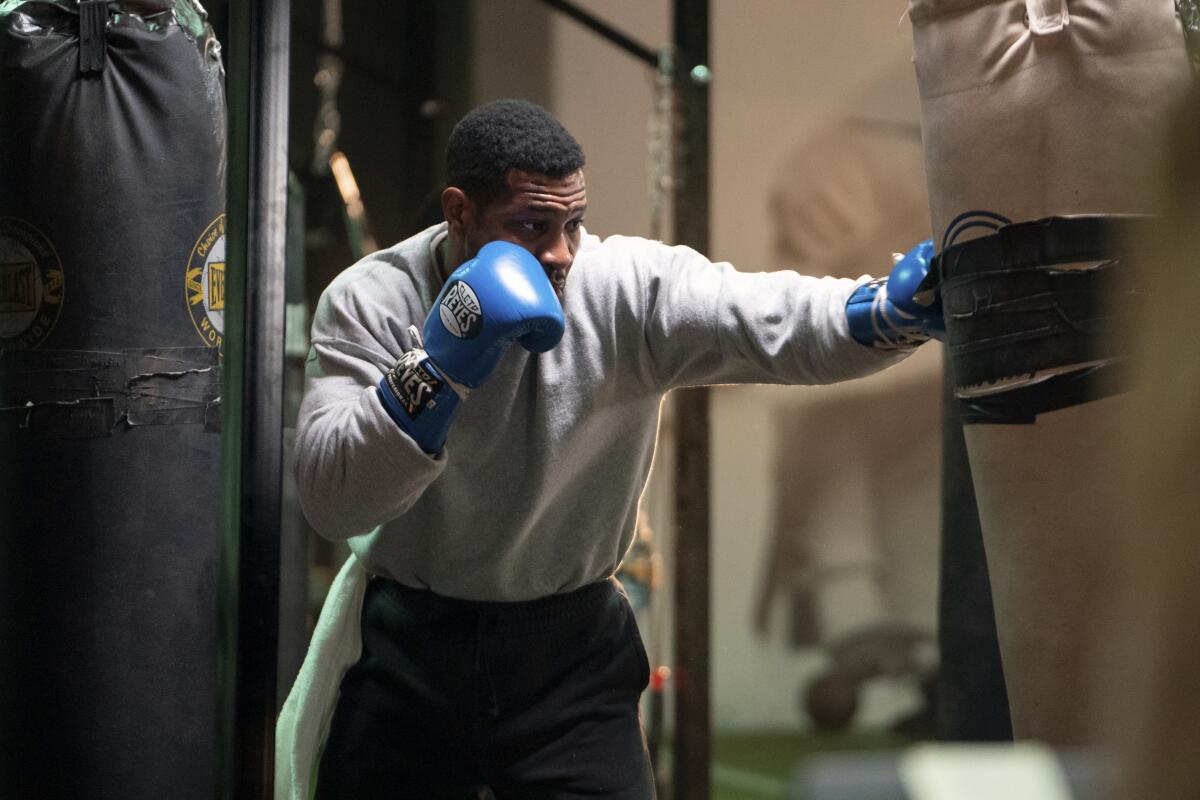
As for Majors, whatever the outcome of the case, the sudden halt to a blazing career marks a stunning reversal of fortune. In the promotional run-up to “Creed III,” star and director Jordan labeled himself and Majors the next “Al Pacino and Robert De Niro.” (Jordan has not spoken publicly about the allegations against Majors.) Now, it’s hard not to pore over the self-aware confidence, playfulness and endearing quirkiness Majors projected for signs of the coming skid.
On “The Late Show with Stephen Colbert” in February, for instance, he clutched a small cup that he regularly carries in public, which symbolizes a warning from his mother when he left home at 18 to become an actor.
“She said, ‘Mind your cup, you are a vessel; no one can fill you up, and no one can pour you out,’” Majors told Colbert. “It’s a reminder that even in this craziness ... no one can pick me up or tear me down.”
Staff writer Christie D’Zurilla contributed to this report.
More to Read
The biggest entertainment stories
Get our big stories about Hollywood, film, television, music, arts, culture and more right in your inbox as soon as they publish.
You may occasionally receive promotional content from the Los Angeles Times.




